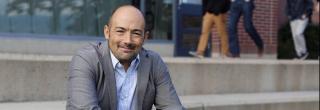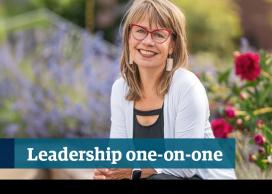A UBC Vancouver alum, Dr. Gordon Binsted is in the field of human kinetics. After holding positions at the University of Illinois, the Beckman Institute, and the University of Saskatchewan, he returned to UBC in 2007 — this time to the Okanagan campus — as professor in the School of Health and Exercise Sciences. He was appointed Dean of the Faculty of Health and Social Development in 2011, and most recently took on an additional role as Associate Provost, Academic Health Initiatives.
Q1. What quality do you most admire in a leader?
GB: A good leader needs to have a clear vision for where they’re going, and to be able to convince people of why it is a good place to go.
Q2. What makes you laugh?
GB: Usually idiosyncratic and peculiar moments in life have me laughing!
In terms of TV shows, I really enjoyed the Big Bang Theory when it first came out. And I like the smart humour in shows like Fawlty Towers and The Office (the British one), and in books like The Hitchhiker’s Guide to the Galaxy.
Q3. Who inspires you, and why?
GB: Of twentieth century leaders, I think no one holds a candle to Barack Obama, for his vision and eloquence.
In more academic fields, I’m inspired by the people who can see something nobody else can, like Nicolaus Copernicus. He completely re-thought the way we view the world in a really fundamental way.
On a personal level, it would be my late father in law, Peter Larkin. He was an Order of Canada fish biologist, VP Research at UBC Vancouver and a brilliant man. He wrote an article called From Rubber Boots to Recombinant DNA: Sockeye Research In the Past 35 Years. This provided really visionary views on — in this case — how fish biology and conservation work. For me, he inspired the idea of becoming an academic.
Q4. What’s your biggest accomplishment so far at UBC?
GB: My most tangible accomplishment is the role I played in building the School of Health and Exercise Sciences. It started as a program in 2007 with just three of us and we would brainstorm our Faculty strategy while running the trails around campus!
It was a chaotic and interesting time. We submitted class proposals to the Okanagan Senate just two months before the classes went on offer to the students. The first lab with the students involved unpacking the equipment, as there was no one else to do it!
Very quickly, student demand for the program went up — from 50 students in the first year to 225 this year.
And this year, the School, in partnership with UBC Vancouver’s Kinesiology, was ranked fourth in the world and first in North America in the QS University Rankings in sports-related subjects.
Q5. What’s the most important lesson you’ve learned?
GB: Leadership in universities is about influence, not power. It’s about knowing what is going to happen, and if you don’t know, having contingencies so it looks as though you did know!
Q6. How do you like to recharge?
GB: Whether it’s running, biking, skiing or going on canoe trips, I like to be outdoors, exercising, and spending quality time with family and friends.
Q7. For you, what makes UBC different?
GB: Each campus is so different. UBC Okanagan offers a real dynamism that allows you to do things like grow a program into a School in eight years.
Whenever you start to feel frustrated because things aren’t moving as fast as you hoped, almost always, something opens up to allow you to do it, maybe in a different way.
There’s a real entrepreneurial spirit about the campus. If you are beholden to rigid rules, this place may be a little difficult. But if you like the freedom to discover and figure things out, it is a liberating place to work. With that, though, comes a whole lot of unknown!
Q8. What is the best advice you were ever given?
GB: At a university leadership course a few years ago, we talked about transparency in leadership. The speaker’s idea was that leaders need to be transparent in their processes, and clear that in some instances there’s no way — legally and morally — that you can be transparent. At best, you can be translucent in those cases. So, it is important to be clear about what you can and can’t be transparent about. That kind of clarity is critical, because without it, people can think they have a role in a decision-making process when they don’t, and they think they should be able to know something which they can’t.
Q9. What do you value in your colleagues?
GB: The job of academics is to have an opinion and try to convince you of it. So, I value having colleagues who will challenge me. I value people who can say to me that something is wrong, and explain why. That is what this place is about!
Q10. What would you like to be remembered for?
GB: I like to think that I was a pretty good researcher. But with my research, only a small group of friends might follow my career. In my current role — even though I don’t produce as much research as I once did — I can affect the career of many different academics, the work they do, and the students they work with. I’d like to be remembered for that.
Q11. If you could have a super power, what would it be?
GB: I would love to teleport. I find transit a waste of time (even though I have an amazing ability to sleep on all modes of transport, making me a completely useless travelling companion!).
Q12. What does your new role as Associate Provost, Academic Health Initiatives involve?
GB: A number of different academic programs at UBC Okanagan have relationships with ministries and health regions, so that, quite often, multiple people on campus are interacting with them at any one time. A lot of this new role involves managing the broader relationship with some of these parties to ensure that we’re not having different conversations with the same people.
Q13. What are your hopes for UBC in light of the signing of the Okanagan Charter in 2015?
GB: The Okanagan Charter is a call to action to universities and colleges to pay more attention to health and wellbeing, and to help people understand that wellbeing is more than just doing jumping jacks. We’re already making some headway at UBC. This year the Faculty of Health and Social Development introduced HEAL 100 — Health Studies, a first-year course that provides students with knowledge and skills for optimal wellbeing and academic success. We are trying to structure it so that the course can be available to students in all Faculties.
Q14. What do see as the biggest opportunity for UBC in the world of health and social development?
GB: In my experience, there is a lack of understanding in the health care community about who does what outside of one’s own practice. In an effort to address this, we are in the process of reimagining how we train students in the Faculty so that — as early as in their undergraduate degrees — they are getting a broad knowledge of practices under the health and social development umbrella. They will get their entry to practice through their Master’s degree, with a broad knowledge of who does what in the other practices.
On a local level, UBC Okanagan works in a formal Healthy City Partnership with the Interior Health Authority and the City of Kelowna. We each leverage our resources and expertise to increase the health of the people in our community. The Interior Health Authority, like UBC Okanagan, is a relatively new institution, so this is a really exciting opportunity to imagine what a relationship between a university and hospital looks like.
Published: June 1, 2017
Interviewed by: Megan Czerpak, UBC Internal Communications



